原文标题:: : [Issue] Darker than Black: Web3 Needs Dark Pools
原文作者:@SiwonHuh,Four Pillars
原文编译:AzumaOdaily 星球日报
6 月 1 日,CZ 在 X 发布了一篇关于暗池的推文,提议可建立「暗池型永续合约 DEX」,并指出 DEX 实时公开订单的透明性反而可能损害交易者的利益。CZ 的话题快速引发了市场关于加密货币交易隐私与效率问题的讨论,尤其是其中的暗池概念更是激发了市场的极高兴趣。在本文中,我们将系统性地解析暗池的定义以及 Web3 领域暗池的意义。
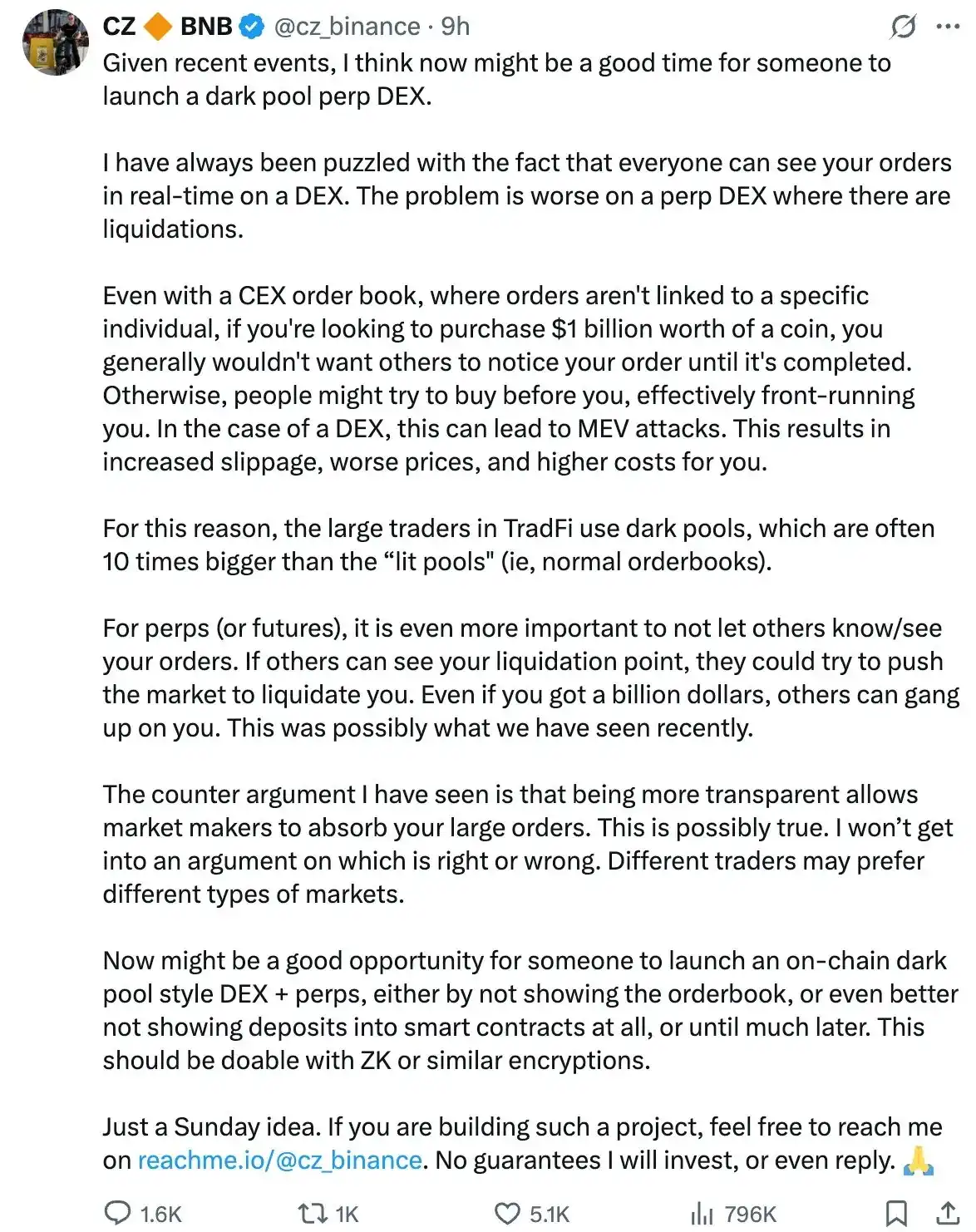
什么是暗池?
传统金融中的暗池
虽然 CZ 的表述可能造成「暗池是 Web3 特有产物」的误解,但暗池实则是金融市场长期存在的私有交易平台。
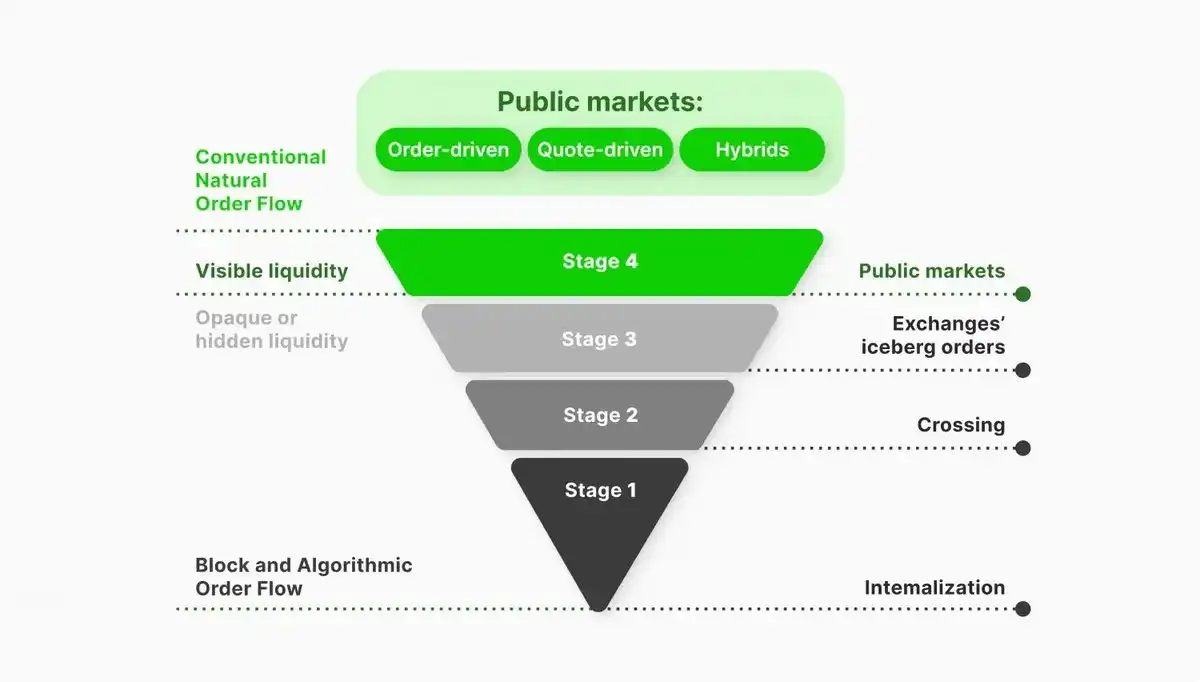
暗池的历史可追溯至 1979 年,美国证监会(SEC)通过 19 c-3 条例,允许特定交易平台上市的证券在其他平台交易。随后 1980 年代基于电子交易的高频交易(HFT)兴起,使订单簿信息较以往更广泛地被暴露,这催生了机构投资者对不公开大额交易的私有交易场所的需求。
通常我们接触的都是纽交所(NYSE)、纳斯达克等公开交易平台,但在这些公开市场建立大额买卖仓位时,会显著冲击市场价格并可能给普通交易者造成意外损失。暗池即指让进行此类大宗交易的机构或大型投行能够私下执行的独立交易系统。
传统交易平台中所有买卖订单都公开显示在订单簿上,而暗池在成交前不会披露订单价格或数量。凭借此特性,大型机构投资者可隐藏交易意图,同时最小化市场影响。截至 2025 年,美国股票交易量的 51.8% 通过暗池完成,表明其已从补充性交易手段发展成为主流交易方式。
这种暗池交易与加密货币场外交易(OTC)存在差异。暗池运营方通过融券卖空积累股票向买方交付购买量,由于需向 FINRA 等金融监管机构披露卖空交易明细,暗池交易细节和规模实际是被披露的,区别在于不透露直接发起交易的机构身份。当前暗池交易量以 DIX 指数形式披露,交易者通常会据此推测机构资金流向。
传统暗池的争议
然而,传统金融市场的暗池一直备受诟病——由于传统暗池由中心化运营商管理,当腐败收益远高于罚款成本时极易被滥用,现实中已出现多起暗池犯罪案例。
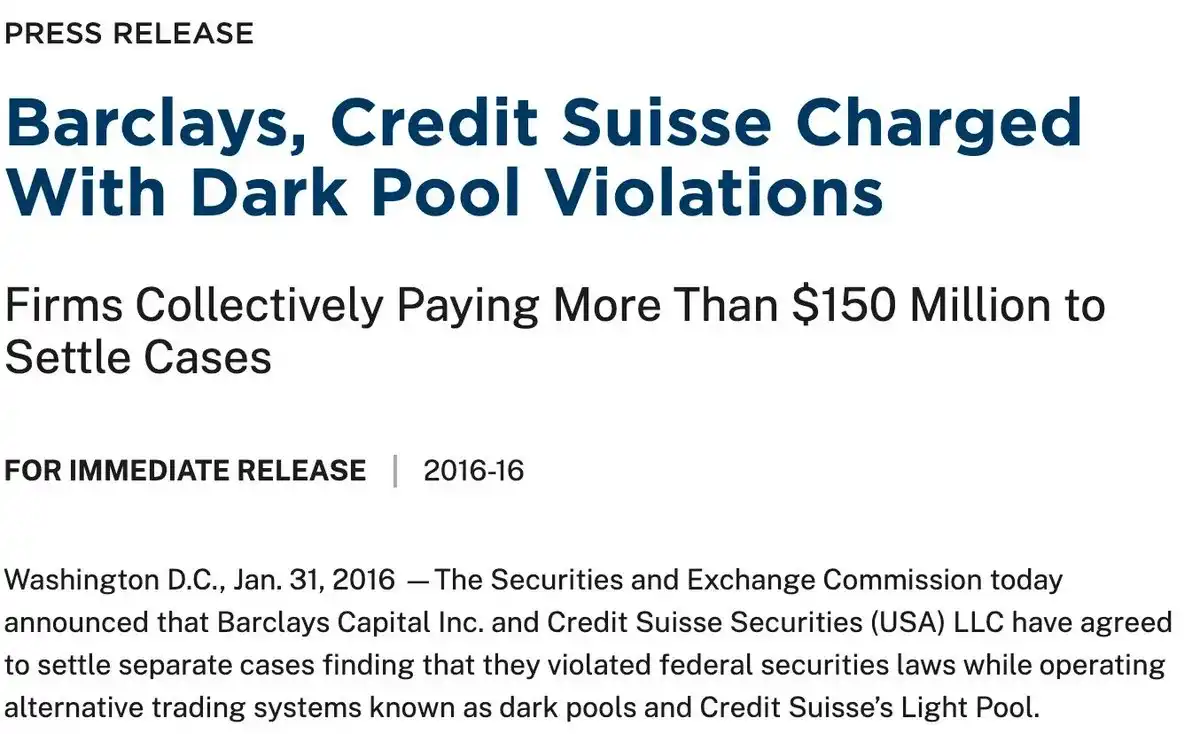
2016 年,多家金融机构因暗池业务违反联邦法律被处以超 1.5 亿美元罚款,其中巴克莱和瑞信更因违反暗池监管条例被 SEC 起诉。指控包括向客户虚假陈述暗池参与者构成,或未透明披露就向高频交易公司提供优惠条件。
2018 年花旗集团因误导投资者暗池运营情况被 SEC 罚款 1200 万美元。该集团向高频交易公司泄露机密订单信息,使这些公司得以针对花旗客户执行超 90 亿美元交易并从中获利。这些问题根源在于对中心化运营商的信任依赖和利益冲突,这也正是 Web3 去中心化暗池方案能解决的核心痛点。
Web3 领域的暗池创新
暗池概念在 Web3 领域同样受到了关注,并以比传统金融市场暗池更精密透明的形式实现。基于区块链交易数据全公开的特性,Web3 暗池可运用零知识证明(ZKP)、安全多方计算(MPC)等密码学技术确保交易隐私。
Web3 暗池的核心优势在于,相较 Web2 传统暗池能规避运营风险。由于交易通过智能合约自动执行,无需中介且交易者始终完全掌控资产。同时不存在传统暗池运营商滥用客户信息的风险,所有交易流程均可密码学验证。
Web3 暗池还引入了可编程隐私(Programmable Privacy)新范式。开发者可自主决定应用的哪些部分应保持隐私,哪些需要公开。例如保持交易订单隐私的同时,仅向特定监管方公开最终交易结果。该技术虽非传统软件无法实现,但 Web3 技术在可编程隐私协议实施的灵活性与可验证性方面具有相对显著优势。
「暗池型永续合约 DEX」的必要性
CZ 在提出「暗池型永续合约 DEX」的需求时,重点指出了现有 DEX 透明性引发的若干问题。其核心论点及背景支撑如下。
防范 MEV 攻击
DEX 的透明性是 MEV 攻击的主要诱因之一。当 DEX 订单在区块链内存池内被公开时,MEV 机器人会侦测并实施抢先交易(frontrunning)、尾随交易(backrunning)或三明治攻击(sandwich attack)。这导致交易者最终成交价格偏离预期,大额订单的滑点更是会显著增加。CZ 也举例表示「如果你想执行 10 亿美元规模的订单,必然希望在市场察觉前完成交易」,主张暗池是解决此类问题的必要方案。
增长潜力
CZ 指出暗池在传统金融市场已广泛应用,并强调其流动性规模可达公开交易平台的 10 倍以上。他认为加密货币市场同样需要类似解决方案,特别是在永续合约等高杠杆产品中,交易者的隐私保护更为关键。
除 CZ 的论述外,近期 Web3 市场对暗池的需求也显著增长。Blocknative 研究显示,2022 年以太坊私有内存池交易仅占总量的 4.5%,而当前则已占据 gas 费消耗的 50% 以上。尽管 Solana 网络不存在内存池机制,但各类交易机器人和钱包解决方案已将 MEV 防护功能列为标配,表明用户对 MEV 的认知度大幅提升。这清晰印证了 Web3 社区已意识到交易透明度对结果的影响,并产生主动规避的需求。
DEX 透明性的潜在危害
CZ 特别强调了「DEX 实时公开所有订单」的特性在永续合约交易中会造成严重问题。永续合约 DEX 中,交易者的持仓和清算价格均暴露在链上,使得恶意参与者可能利用这些信息操纵市场。例如,当其他交易者识别出巨鲸的清算价格后,可能故意推动市场价格触发强制平仓。CZ 将此现象与「近期事件」关联,疑似指向 Hyperliquid 的 HLP 清算事件或 James Wynn 的大仓位爆仓案例。
比 CZ 推文更具体的解释可参考 Hashed 创始人 Simon Kim 近期撰写的文章。该文章指出,Web3 虽然承诺去中心化和隐私保护,实则构建了史上最透明的监控体系——所有交易被永久记录、向所有人公开,并接受 AI 分析。
文章特别以 MicroStrategy(现 Strategy)案例进行了说明,即便企业也无法逃避追踪。尽管 Michael Saylor 曾多次警告公开钱包地址的风险,区块链分析平台 Arkham Intelligence 仍逐步成功追踪到该公司 87.5% 的比特币持仓。
文章还聚焦了 James Wynn 在 Hyperliquid 的上亿美元爆仓事件,直指暗池的巨大需求。Wynn 曾以 40 倍杠杆建仓 12.5 亿美元的比特币多头仓位,但由于其清算价格公开可见,引来了市场参与者针对性的狙击。事实上,一名交易者持续对 Wynn 的仓位做反向操作,一周内获利了 1700 万美元。该事件既证明了永续合约 DEX 透明性的反噬效应,也说明不暴露仓位信息的交易环境存在充分市场需求。
链上暗池的不同实现方式
尽管许多人可能是通过 CZ 的推文首次接触暗池概念,但已有多个项目在推进暗池建设。由于实现「交易隐私」这一暗池核心目标存在多种技术路径,各项目采用了不同的加密方案。以下是主要实现方式及代表项目。
Renegade
Renegade 是当前最受关注的链上暗池项目之一,该项目部署在 Arbitrum 主网,旨在通过结合安全多方计算(MPC)与零知识证明(ZKP)构建隐私解决方案。
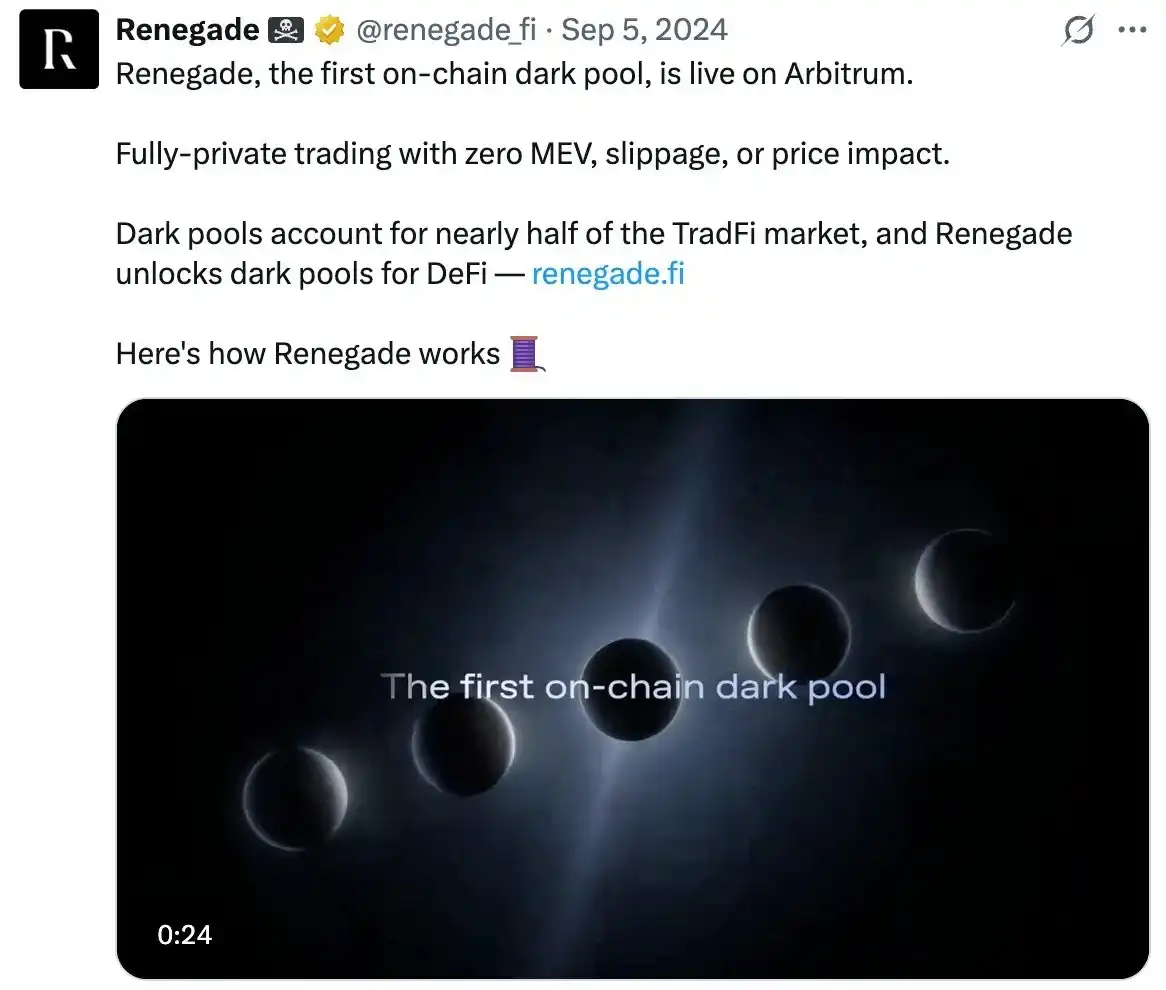
在 Renegade 中,所有状态(余额、订单簿等)均由交易者本地管理,不依赖中心化或分布式服务器。交易执行需同时知晓新旧钱包状态,并向智能合约提交三项信息:承诺(commitment)、无效标识符(nullifier)及有效性证明(validity proof)。该结构与 Zcash 等 ZK 项目类似。
Renegade 的核心特性是确保交易前后的完全隐私:交易前隐藏订单细节(价格、数量、方向等),交易后仅对手方知悉资产交换情况。所有交易均锚定 Binance 实时中间价执行,无滑点或价格影响,这种类 Web2 的体验极具吸引力。
Renegade 的架构中,多个独立中继器通过 P2P 网络持续执行 MPC。在 MPC 过程中,Renegade 会证明名为「VALID MATCH MPC」的特殊 NP 命题,验证交易双方确实掌握有效的输入订单。通过这种协作式零知识证明结构,为用户提供完全匿名性、隐私性与安全性。
Arcium
Arcium 是 Solana 生态的隐私项目,采用基于加法秘密共享的 MPC 技术实现「加密共享状态」。开发者可借此在链上存储加密状态并执行计算,同时不暴露原始数据。该方案支持无交互的本地加法运算与单轮通信的乘法运算,且保持强安全性。
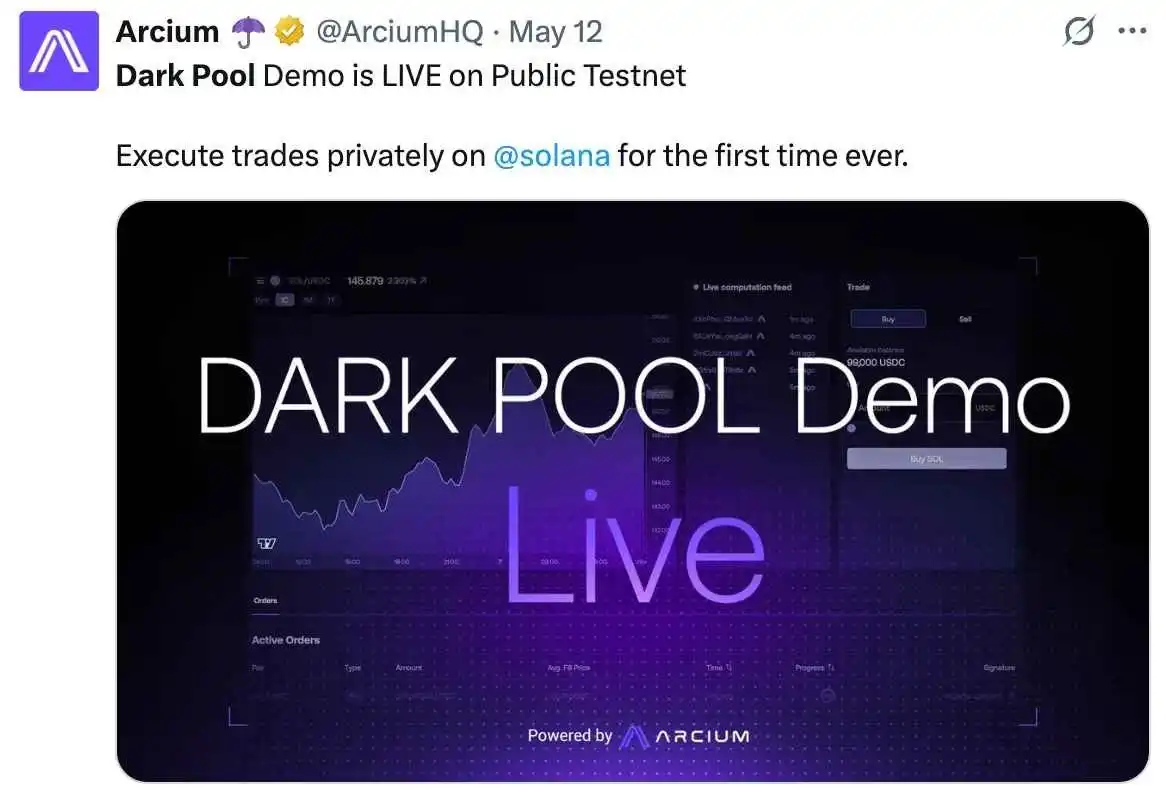
Arcium 还引入了可编程隐私,允许开发者在 Solana 程序中指定哪些状态需加密存储,哪些函数应对加密状态执行计算。Arcium 的 MPC 任务由名为 MXE 的虚拟执行环境管理,负责设置数据、程序及计算节点等参数。这种架构支持类似 Solana 的大规模并行交易处理。近期 Arcium 已在 Solana 测试网成功部署暗池演示版,成为该链首个机密交易场所。任何 Solana DeFi 团队都可基于 Arcium 构建暗池,为用户提供隐私交易服务。
Aztec
Aztec 是一个以太坊隐私型 ZK-Rollup 解决方案,2022 年曾完成由 a16z crypto 领投的 1 亿美元 B 轮融资,成为了隐私技术领域单笔获投资金最大的项目之一。与 Arcium 类似,Aztec 允许开发者标注私有函数——被标注的函数在用户设备本地执行并生成证明,仅公开函数在 Aztec 网络执行。私有函数的状态值以 UTXO 形式存储,仅所有者可解密,确保除用户外无人可读取。
Aztec 曾与 Ren Protocol 合作开发基于暗池的隐私交换协议,其系统通过名为 Aztec Notes 的 ZK 代币进行交易,订单簿不披露任何交易信息。用户充值后,Aztec 通过链下 UTXO 系统创建类现金的加密凭证,交易执行时状态树更新加密消息,仅所有者可查看凭证内容,完全保护用户身份与余额。
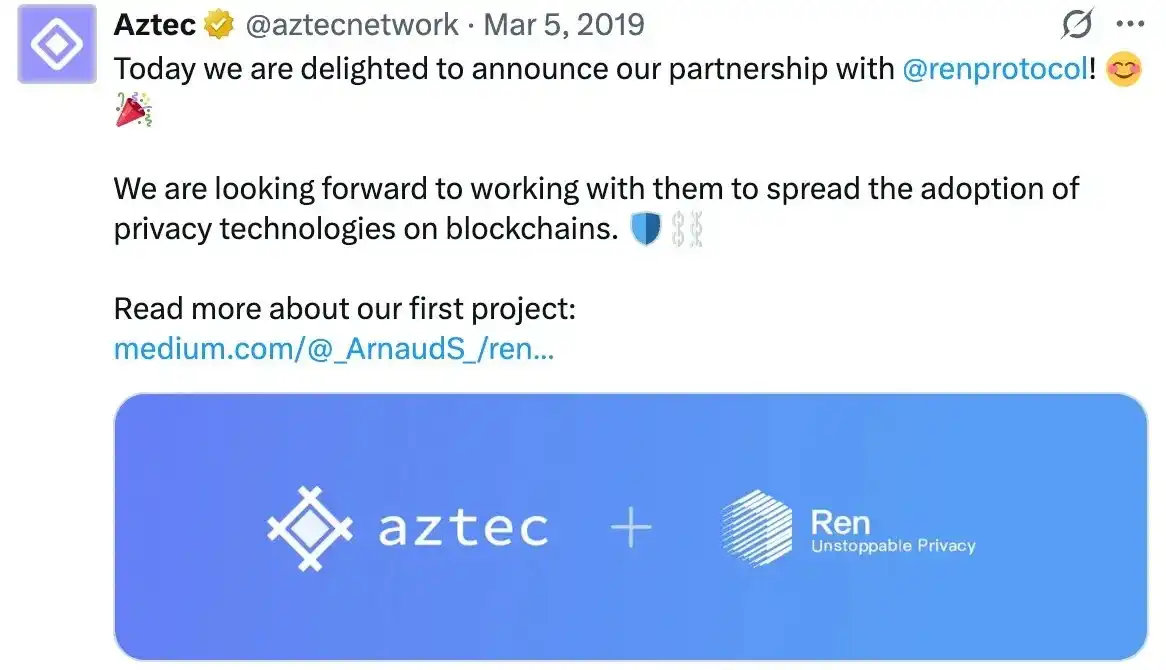
暗池的挑战与机会
Web3 暗池面临的最大技术挑战是可扩展性与性能问题。当前 MPC 和 ZKP 技术计算密集,处理大规模交易量仍存在局限。以 Renegade 为例,其 P2P 网络结构会因参与者数量增加导致复杂度指数级上升。
此外,暗池的隐私性与可扩展性也存在一定的权衡关系。Aztec 联合创始人 Zac Williamson 曾指出:「完全隐私的交易包含更多数据,因为所有内容都需加密。这会消耗更多资源,从而降低可扩展性。」要突破这些根本性限制,需开发更高效的密码学算法库。
网络稳定性同样是重要挑战。近期 Arcium 在 Solana Devnet 上测试基于其测试网的暗池演示应用时,部分节点因高流量崩溃导致订单队列积压。该测试本就是为了验证基础设施稳定性并在主网上线前解决问题,故障已迅速修复。这表明暗池实现需要精密技术和充分测试来应对高负荷需求。
长期来看,暗池有望成为加密货币交易生态的重要组成。考虑到 CZ 提及传统金融中暗池交易量占比超 50%,其在加密市场可能达到相似比例。随着机构投资者入场加速,这一趋势将更明显。
这不意味着现有 DEX 会被完全替代,二者更可能形成需求互补的关系——价格发现重要的小额交易在现有 DEX 进行,而隐私需求强的大额交易则在暗池完成。暗池的发展还将超越隐私领域向外扩展。如 Arcium 所探索的,AI、DePIN 和供应链管理等领域对隐私保护技术的需求正在增长。作为隐私革命的起点,暗池有望发展成隐私生态的核心组成部分。
免责声明:本文章仅代表作者个人观点,不代表本平台的立场和观点。本文章仅供信息分享,不构成对任何人的任何投资建议。用户与作者之间的任何争议,与本平台无关。如网页中刊载的文章或图片涉及侵权,请提供相关的权利证明和身份证明发送邮件到support@aicoin.com,本平台相关工作人员将会进行核查。



